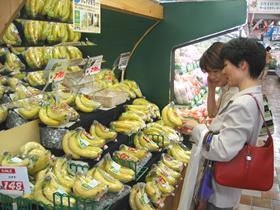
Produce groups are on a mission to boost falling fruit consumption in Japan.
The US’ agricultural trade office (ATO) in Tokyo launched a Japanese business-to-business guidebook late last year extolling the virtues of US-grown fruit (Enjoy Fruits!) to food industry buyers and marketers. At the same time Japanese produce consultancy Yamano & Associates (which represents several US produce groups in Japan) has set up a consumer-focused website (the Fruit Clinic) to dispel produce misconceptions and provide information on fruit’s health and beauty benefits.
Enjoy Fruits! is designed to raise the profile of US-grown fruit among Japanese fruit buyers and consumers, the ATO said. The guidebook maps out the different varieties produced across the US, their seasonal availability, their health benefits and includes ideas for consumer-targeted fruit campaigns, such as fruit carving competitions, fruit-only cocktail recipes and fruit art.
The US believes opportunities exist for its fruit in Japan thanks to decreasing domestic fruit production, increased demand for US-style restaurants, and the market’s high receptivity to US high-value products.
Yamano & Associates, meanwhile, hopes to quash common misconceptions among Japanese consumers (unearthed by market research) about fruit being fattening and bad for health due to its high-sugar content.“Via our online fruit clinic, we are telling consumers that weight gain is caused by a high-calorie diet, and that fruit is a low-calorie, low-GI food,” said Yamano & Associates’ Hisao Takeda.
These projects are designed to change Japanese eating habits and reverse a worrying trend: since the 1970s fruit consumption has fallen annually in Japan, according to the US Department of Agriculture (USDA), due to shrinking family size and more people eating out. In 2008, annual consumption of fresh fruit per household had fallen to 95kg from 213kg in 1973. Average annual per capita fruit consumption was measured at 27kg in 2011. And younger generations (those in their 20s and 30s) reportedly eat 30 per cent less produce than the over 60s.
The impact of this trend is being felt acutely by the country’s produce importers, who in recent years have also struggled with the effects of a weak yen, higher import costs and retail price wars on their businesses.
“There is nothing good about the situation,” said Don Okazoe, managing director of importer IPM Nishimoto, which imports and distributes fruit across Japan to the wholesale and retail sectors. “Consumption is falling, there is produce oversupply and retailers are trying to sell fruit cheaper and cheaper.”



